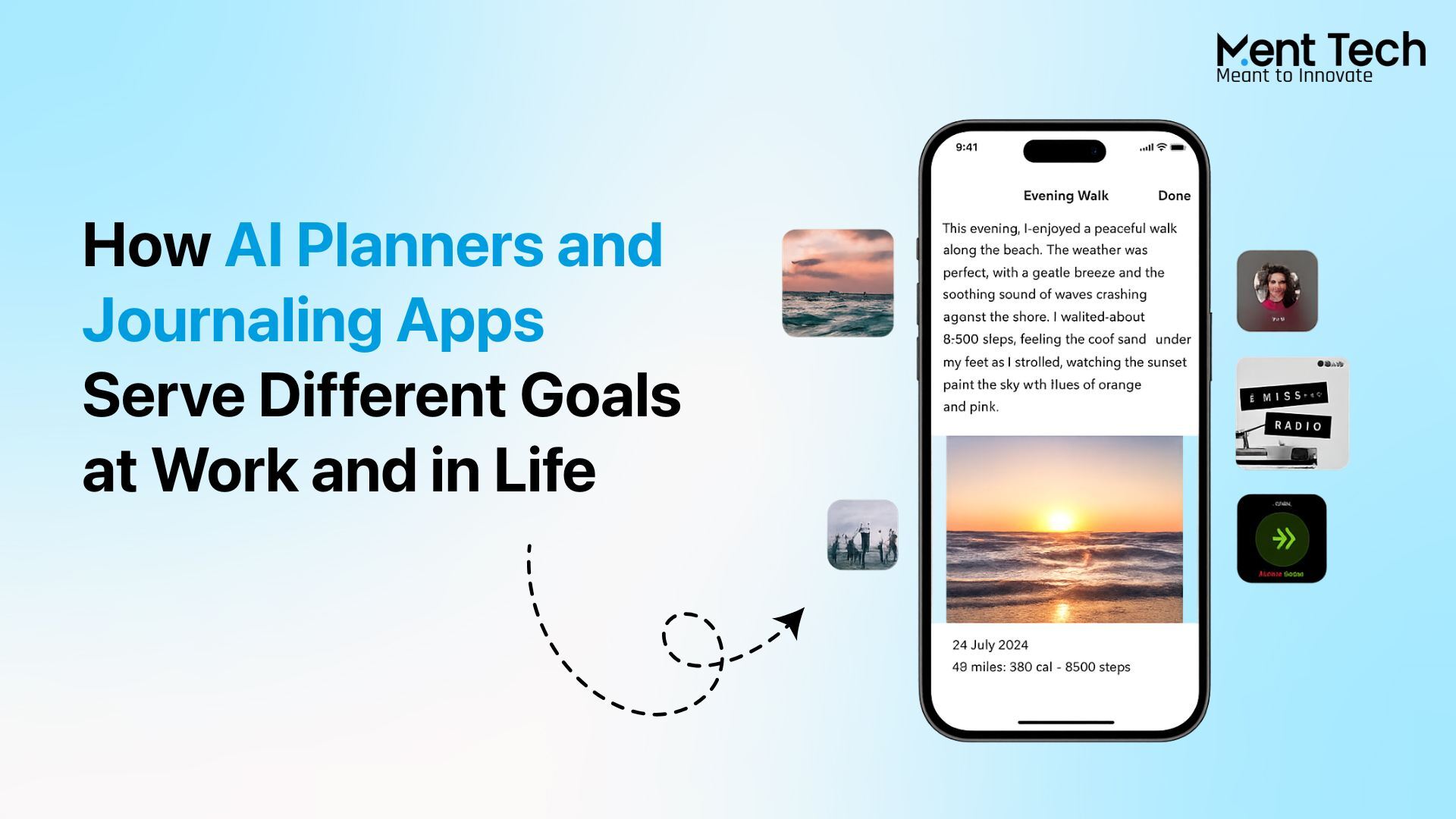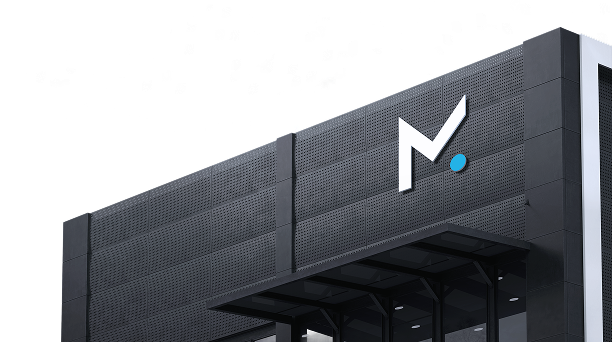You start your day with positive intentions. Maybe a to-do list, maybe just a mental plan. But then a meeting runs over, a message derails your focus, and by noon, the day has taken a different shape. You’re not alone.
This is where AI-powered productivity tools are starting to reshape the way we manage time and energy. On one side, you have the AI daily planner, a tool that turns chaos into structure by organizing your day in real time. On the other, the AI journaling assistant helps you slow down, reflect, and understand the patterns behind your decisions and habits.
Both tools promise better focus and less overwhelm. But they take very different paths to get there.
In this blog, we’ll look at AI daily planners vs. journaling assistants not as two competing apps, but as two approaches to productivity. The goal isn’t just to choose one; it’s to find what actually works for the way you think, plan, and get things done.
What Is an AI Daily Planner?
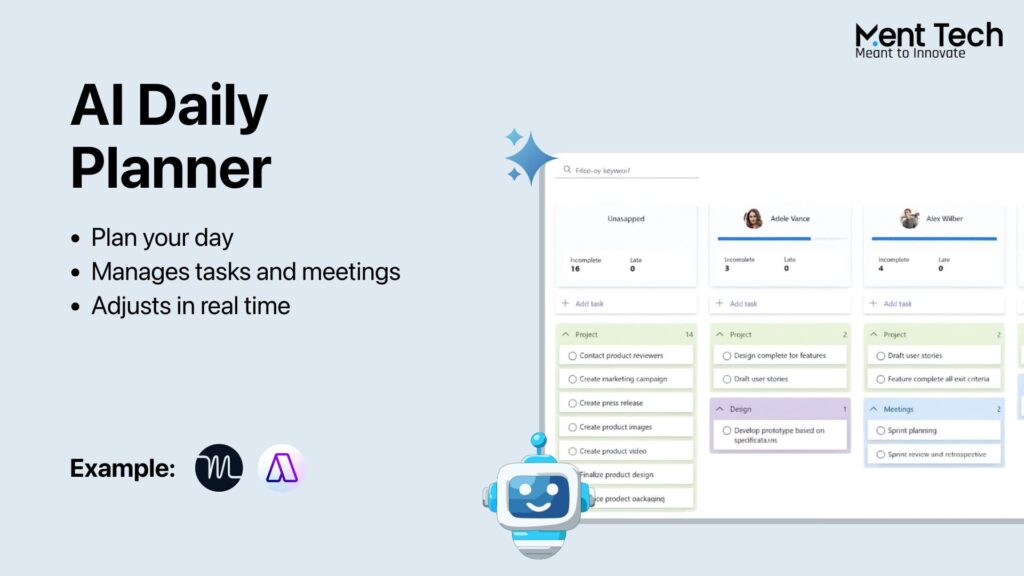
An AI daily planner is a tool that helps you organize your day. You add your tasks or meetings, and the planner arranges them into a schedule that actually fits. It uses AI to understand your workload, your deadlines, and even how long things might take.
Some AI daily planner apps adjust your schedule in real time. If a meeting runs late, the rest of your day shifts automatically. If you skip a task, it moves it to another time without you needing to think about it.
Many of these tools also connect with your calendar, to-do list, and email. You get one space where everything lives, and the AI keeps it updated.
Popular apps like Motion and Akiflow are examples. They are used by people who want to stay on track without planning every hour themselves.
If you often feel like your day gets away from you, this kind of tool can help bring structure without adding more work.
What Is an AI Journaling Assistant?
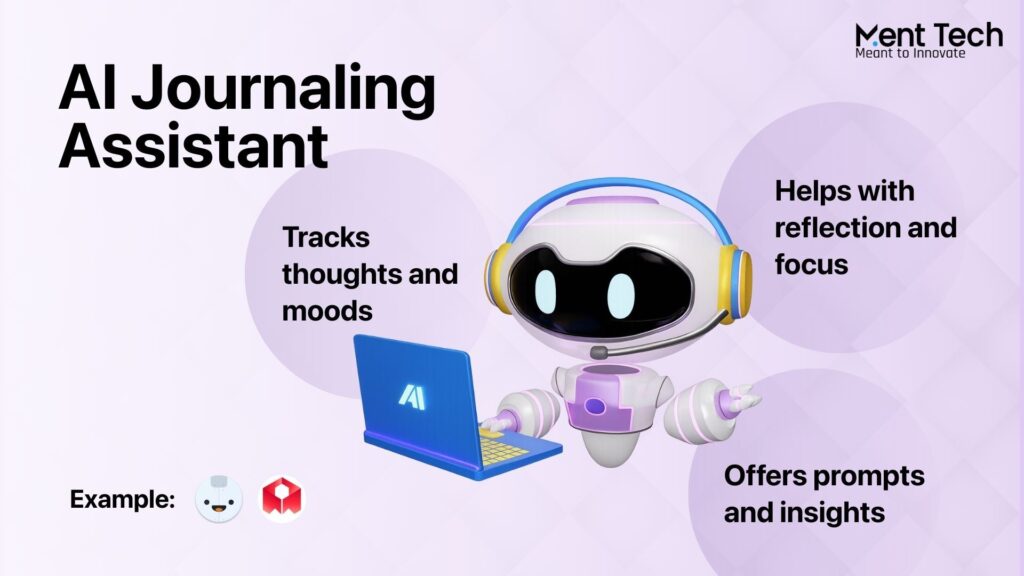
An AI journaling assistant is a tool that helps you reflect on your day, your goals, and how you feel. You type your thoughts into it like a regular journal, but the AI reads what you write and gives you helpful feedback.
It may help you stay on track by suggesting things to do, reminding you of goals, or showing mood patterns. Some tools also give writing prompts, which can be useful if you’re not sure where to start.
These apps are more about awareness than planning. They help you understand what’s working, what’s not, and how your habits are connected to your mindset.
Apps like Reflectly, Rosebud AI, and Mindsera are common choices. They are often used by people who want to stay grounded, reduce stress, or build healthier routines.
If you want more clarity and focus in your day, journaling with AI support can help you see the bigger picture.
Structured vs. Reflective Productivity: What’s the Real Difference?
Every productivity tool claims to make your day better, but not all of them help in the same way. Some are built to help you plan. Others are designed to help you think.
An AI daily planner app is all about structure. It helps you map out your day by organizing tasks, setting reminders, and managing your time hour by hour. This type of tool gives you a clear path to follow. It removes guesswork and helps you move from one task to the next without slowing down. You focus on execution. It is built for people who want to stay in motion.
In contrast, an AI journaling assistant is built for reflection. Instead of managing tasks, it helps you understand what is behind them. These tools prompt you to slow down, write about your day, track how you feel, and see the habits forming over time. A good journaling & goal tracker does not push you to work more. It helps you work smarter by showing what actually improves your focus and what gets in the way.
So the difference is simple. A daily planner keeps you moving. A journal helps you think clearly. This option gives you control of your time. The other person provides you with clarity regarding your thoughts.
The best productivity strategy often depends on what you need right now: action or awareness.
AI Daily Planner vs Journaling Assistant
| AI Daily Planner | AI Journaling Assistant | |
| Main Function | Plans and schedules your day with AI-generated structure | Prompts self-reflection and tracks personal patterns |
| Focus Area | Task execution, deadlines, calendar syncing | Behavior, mindset, long-term goal awareness |
| Best For | Busy professionals, remote workers, agency teams | Students, creatives, wellness-focused users |
| Core Technology | Real-time task automation, smart reminders | AI-assisted journaling prompts, emotional insights |
| Common Goal | Finish tasks efficiently and stay on schedule | Improve focus, reduce mental clutter, stay intentional |
| Example Tools | Motion, Akiflow, Notion Calendar | Reflectly, Mindsera, Rosebud AI |
Industry Use Cases & How These Tools Fit Different Workflows
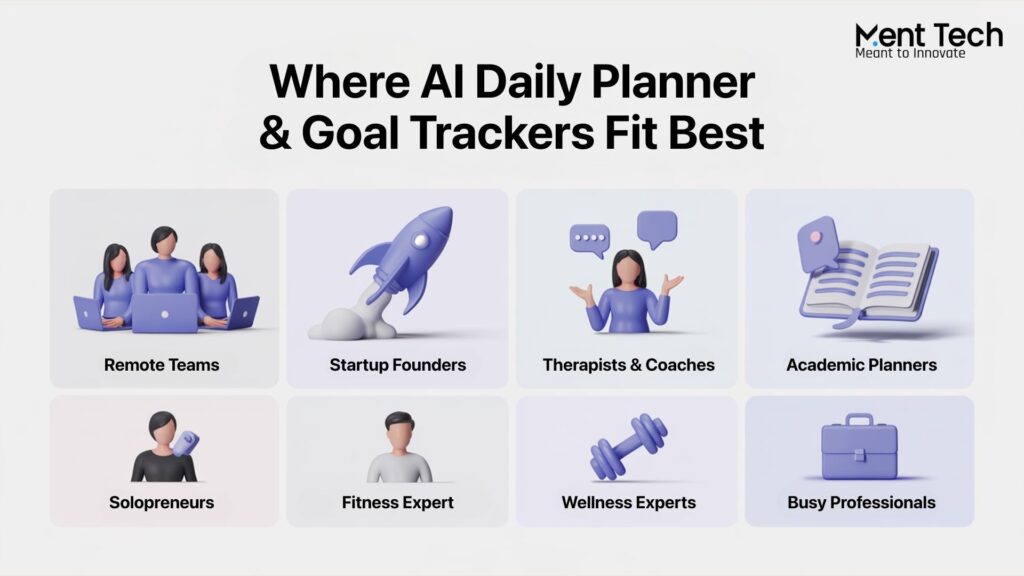
1. SaaS Teams Managing Daily Execution
Startups move fast. In a typical SaaS team, schedules shift daily. Product releases, bug fixes, and meetings compete for attention. An AI daily planner app helps team members stay on track by organizing tasks, reshuffling priorities, and protecting deep work time without constant manual input.
Instead of switching between five tools, team members get one view that updates in real time. The planner adjusts based on context, helps with weekly goal alignment, and keeps execution focused without constant micromanagement.
2. Coaches and Wellness Services Guiding Growth
For wellness coaches, therapists, and habit-based programs, the real challenge is keeping clients engaged between sessions. An AI journaling assistant or journaling & goal tracker helps users reflect daily, explore their emotions, and stick to progress goals without feeling alone.
These tools offer structured prompts, smart feedback, and even emotional insights. They create a private, trusted space where clients open up more, stay motivated, and arrive at their next session with real progress to show.
3. Creators and Solopreneurs Managing Chaos
For independent creators, freelancers, and solo business owners, managing work often feels like juggling ten things at once. A smart AI productivity planner helps map out daily tasks, plan content drops, and balance deep work with admin without losing focus.
Instead of running their day off random to-do lists, solopreneurs can use tools like an AI daily planner free app that learns their work style, builds timelines, and reminds them when it’s time to rest or post. It brings calm to the creative grind without adding another layer of complexity.
4. Enterprise Teams Scaling Accountability
Large teams often struggle with alignment across roles, departments, and time zones. That’s where AI journal assistants and goal tracking platforms support culture and accountability. Each team member can reflect, set goals, and review blockers in a personal space that feeds into team insights.
Leaders can spot performance patterns, understand roadblocks, and nudge progress gently through weekly pulse checks. It replaces long emails and forgotten check-ins with simple, focused feedback loops that drive execution forward.
5. Mental Health Coaches and Wellness Experts
Therapists, coaches, and wellness practitioners use AI journaling apps to help clients build self-awareness outside of sessions. A guided journaling tool offers daily prompts, mood check-ins, and thought tracking. These tools help users reflect between appointments, creating a stronger connection to their emotional patterns.
For coaches, the platform becomes a passive partner, offering personalized insights and spotting recurring behaviors that need attention. Whether it’s burnout, motivation dips, or recurring stressors, the Hire AI developers supports meaningful progress with less manual tracking.
6. Students and Academic Planners
Students are overwhelmed with exams, projects, and deadlines. An AI daily planner helps break down their semester into manageable pieces. From weekly study goals to reminder nudges for submissions, it’s like having a digital academic coach in your pocket.
Combined with goal tracking and reflection tools, these platforms allow students to see what’s working and adjust routines. Many free AI planner apps are now replacing generic schedules with personalized timelines that match their learning styles.

AI Wellness Apps Are Becoming Daily Essentials
AI-driven meal planning apps are a growing part of the daily productivity and health tech ecosystem, sharing common foundations with AI journaling and daily planning apps.
According to recent reports, the AI-driven Meal Planning Apps Market is projected to grow from USD 972.1 million in 2024 to over USD 11.56 billion by 2034, with a CAGR of 28.1%.
This reflects a broader shift: users are increasingly relying on AI tools for personalized planning, goal tracking, and health management across both work and lifestyle.
What It Might Cost to Build or Use These Tools?
Building an AI Integration service like an AI Daily Planner is not just about adding a calendar with prompts. You are investing in a system that syncs across devices, adjusts to user habits, and offers real time planning support. From calendar integrations to language models that respond instantly, the cost comes from delivering speed, structure, and reliability at scale.
On the other hand, an AI Journaling Assistant focuses more on reflection, storage, and analysis. It does not need to be fast, it needs to be thoughtful. Most of the spend here goes into secure storage, emotional intelligence models, and pattern recognition. You are not just building a tool, you are building a trusted mental companion that evolves with the user.
How the Backend Works for Smart Planning and Journaling?
Building an AI productivity app like a daily planner or journaling assistant requires a modular system that blends real-time user input with intelligent backend processing. On the frontend, a clean UI enables scheduling, note-taking, or goal setting. Behind the scenes, APIs handle task recommendations, calendar syncing, sentiment analysis, and habit tracking.
Both apps rely on components like natural language understanding, time-based triggers, and context-aware suggestions. The architecture should support scalable databases, token management, and rapid response times to ensure the ai as a service feels responsive and personalized.
For a robust and scalable product, the development must also factor in cross-platform compatibility, offline functionality, and secure data storage, especially for user journals or personal goals. Integration with external services like Google Calendar, iOS Reminders, or third-party productivity tools adds more utility. Advanced setups may also include microservices for AI modules, allowing separate pipelines for goal tracking, journaling insights, and real-time planning recommendations.
Final Thoughts
The way people plan their days, track their goals, and reflect on their routines is changing. We are seeing a real shift, not just in tech-savvy circles, but across everyday users. Students, professionals, creators, and business teams are all turning to digital tools that think ahead, adapt to their habits, and simplify how they work and grow.
This shift is not just about convenience. It’s about focus, clarity, and saving time. Tools like daily planners and journaling assistants are no longer optional. They are becoming must-haves for those who want to stay organized, reduce decision fatigue, and improve how they manage their personal and work lives.
At Ment Tech Labs, we support this momentum. We help startups and businesses create smart, intuitive products that actually fit into real human routines. As an AI development company building full-stack AI products and infrastructure for practical use cases, we are focused on one thing: making technology feel natural, not forced.
If you are building a daily planner, journaling platform, or any tool designed to help people stay on track, the time to launch is now. People are ready. They are already shifting to systems that save time, make sense, and bring calm to busy lives. Build with speed, design with care, and choose the right partner to bring it to life.
Frequently Asked Questions
An AI daily planner is a smart scheduling tool that helps users manage tasks, organize their day, and stay focused. It adjusts plans in real time, sets reminders, and creates structure for better time use. The best AI daily planner apps can even adapt to how you work over time.
An AI journal assistant focuses more on self-reflection, tracking thoughts, emotions, and progress toward personal goals. Instead of planning tasks, it helps users understand patterns, stay motivated, and improve mental clarity through guided journaling and goal tracking.
Yes. Many people use both for different needs. The AI daily planner handles time management and daily execution, while the journaling and goal tracker supports personal growth and longer-term thinking. Using both together can offer a full-circle productivity system.
Several AI daily planner apps are free or offer free versions. These tools provide basic scheduling features and smart task organization. Paid versions often include deeper personalization, smart reminders, and habit tracking.
An AI planner does more than just show dates. It can prioritize tasks, adjust your schedule when things change, recommend focus windows, and reduce decision fatigue. This makes it much more helpful than a standard calendar or to-do list.
AI assisted journaling offers feedback, suggests prompts, and tracks your patterns over time. While traditional journaling is open-ended, AI journals give structure and help users stay consistent. They also provide insights that are hard to uncover manually.
If your main goal is to get more done each day, start with a daily planner. If your goal is clarity, emotional balance, and long-term self improvement, try an AI journaling and goal tracker. Many apps today combine both, so you do not have to pick just one.
